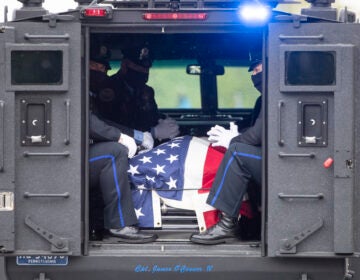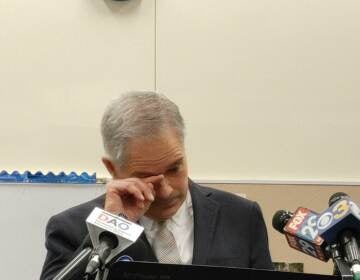Eagles’ Malcolm Jenkins pushing Pa. bill to help seal criminal records

Anquan Boldin, (left) a former NFL player, joins current Eagles player Malcolm Jenkins as he launches his campaign supporting Pa's Clean Slate bill. (Emily Cohen for NewsWorks)
The Philadelphia Eagles’ Malcolm Jenkins is considered one of the best safeties in the NFL. But lately, he’s become less widely known for the tackles he’s racked up than for his clenched fist.
For the past year, Jenkins has started almost each game in silent protest. While the “Star-Spangled Banner” blares out over some stadium, you’ll see Jenkins, standing stoically in his jersey, holding his right fist above his head.
It’s his quiet way of reminding America about the racial injustice ever-present in the lives of people of color.
Off the field, the New Jersey native has been using his voice to advocate for reforms to a criminal justice system that has resulted in the mass incarceration of black men like him.
But after two trips to Capitol Hill to meet with lawmakers, Jenkins is turning his attention closer to home.
On Friday night, during a private event supporting a local nonprofit at an upscale Center City restaurant, he threw his support behind Pennsylvania’s “Clean Slate Act.”
The first-of-its-kind legislation would automatically seal non-violent misdemeanor convictions after 10 years for those who haven’t committed another crime since. Those records would still be available to law enforcement, but invisible to employers and landlords who may be wary of hiring or renting to someone with a record.
“I don’t think this is the solution to everything, but I think it’s a step in the right way,” Jenkins said.
‘I think it’s something I can change’
After visiting Congress this spring to push for national reforms, Jenkins said he returned home to Philadelphia and resolved to see how he could make a difference on the state and local level. That’s when he first heard about “clean slate” and knew he wanted to help make it a reality.
“The criminal justice system has had a heavy hand on communities of color and poor communities,” Jenkins said. “I can see myself in those situations. I can see my family, my kids, my community being affected by it and I think it’s something I can change.”
Jenkins said he helped his younger brother start a business after years of being unable to find work because of a felony conviction he got as a juvenile.
It’s not clear how many of the three million Pennsylvanians with a criminal record the bill might help. But reformers like Jamie Gullen, an attorney with Community Legal Services of Philadelphia, hope it’s the first step to future reforms and that the legislation will become a model for other states.
“We’d like to advocate next for certain felony convictions to be sealed, especially drug offenses,” Gullen said. “We see a huge impact of that on our clients’ lives.”
But first, the Clean Slate Act needs to get over the finish line.
The Pennsylvania Senate passed the bill unanimously in June, but it’s still sitting in the House judiciary committee. It’s not clear when it could come up for a vote. A spokesman for House Speaker Mike Turzai did not respond to a request for comment.
While the bill enjoys bipartisan support and was crafted to appeal to both sides of the aisle, reformers are still holding their breath.
State Rep. Jordan Harris, a Philadelphia Democrat who co-sponsored the measure, said lawmakers are tinkering with the House bill and that it could come up as soon as the end of September.
Jenkins hopes to find a time to sit down with state lawmakers in the coming weeks to express his support.
Harris said he would welcome him to Harrisburg.
“Politics is about pressure and when you can raise awareness and raise the pressure on people to move in certain ways, that’s how things happen,” Harris said.
Jenkins has been joined in his reform efforts by Anquan Boldin. The wide receiver retired from the NFL last month to focus on “something more than football,” he said at the time.
Like Jenkins, Boldin’s cause is also personal.
In October 2015, his cousin Corey Jones was fatally shot by a plainclothes police officer in Florida after his car broke down on the side of a highway. The officer, Nouman Raja was charged with manslaughter and has been under house arrest. The trial begins this fall.
“He murdered my cousin and to see him pay for that would be justice,” Boldin said.
While he hopes fans will respond by contacting their representatives, Boldin said he and Jenkins are mainly trying to use their notoriety to meet with lawmakers face-to-face and tell them these issues must become a priority for them.
“We’re able to get different meetings from senators and congressmen that the ordinary person couldn’t get,” he said. “For some reason, people like sports. They like to hear what we have to say.
“I think it would be irresponsible of us to have that platform and not create change with it,” he said.
WHYY is your source for fact-based, in-depth journalism and information. As a nonprofit organization, we rely on financial support from readers like you. Please give today.




